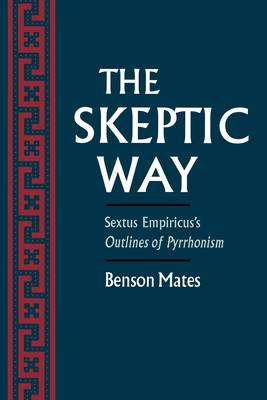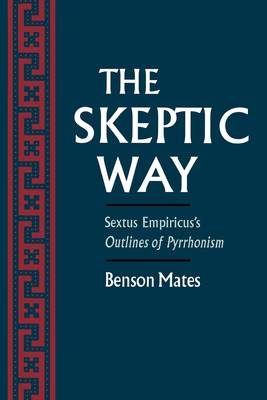
- Retrait gratuit dans votre magasin Club
- 7.000.000 titres dans notre catalogue
- Payer en toute sécurité
- Toujours un magasin près de chez vous
- Retrait gratuit dans votre magasin Club
- 7.000.0000 titres dans notre catalogue
- Payer en toute sécurité
- Toujours un magasin près de chez vous
The Skeptic Way
Sextus Empiricus's Outlines of Pyrrhonism
Benson Mates, Sextus
Livre broché | Anglais
51,95 €
+ 103 points
Description
The Outlines of Pyrrhonism by the 2nd century A.D. Greek physician Sextus Empiricus was immensely influential in the history of Western philosophy. The rediscovery and publication of this work in the sixteenth and seventeenth centuries led directly to the skepticism of Montaigne, Gassendi, Bayle, Descartes, Berkeley, Hume, and others, and eventually to the preoccupation of modern philosophy with attempts to refute or otherwise combat philosophical skepticism. In recent years, however, it has become apparent that Pyrrhonism--the form of skepticism professed by Sextus--is in several important respects quite different from the modern forms of skepticism to which the writings of Sextus have given rise. Some of these differences are of particular philosophic interest because they seem to render the ancient form immune to many of the standard responses to skepticism that are made today.
In this book, which incorporates a new translation of the Outlines in their entirety, Benson Mates presents Pyrrhonism not as a mere historical curiosity, as has often been done, but as a philosophical position eminently worthy of serious philosophical consideration here and now. His thorough introduction sets the stage by explaining what Pyrrhonism is and what it is not, and by contrasting it in the relevant respects with modern skepticism. He gives particular attention to explicating a number of quasi-technical terms that occur frequently in the Outlines and have decisive bearing on the philosophical content. By rendering these terms more accurately and uniformly in his translation, he seeks to make the essential feautres of Sextus's Pyrrhonism more evident to the reader.
The latter part of the book consists of a detailed Commentary, which endeavors to discuss and explain the work, section by section, from a philosophical (as contrasted with a philological) point of view.
In this book, which incorporates a new translation of the Outlines in their entirety, Benson Mates presents Pyrrhonism not as a mere historical curiosity, as has often been done, but as a philosophical position eminently worthy of serious philosophical consideration here and now. His thorough introduction sets the stage by explaining what Pyrrhonism is and what it is not, and by contrasting it in the relevant respects with modern skepticism. He gives particular attention to explicating a number of quasi-technical terms that occur frequently in the Outlines and have decisive bearing on the philosophical content. By rendering these terms more accurately and uniformly in his translation, he seeks to make the essential feautres of Sextus's Pyrrhonism more evident to the reader.
The latter part of the book consists of a detailed Commentary, which endeavors to discuss and explain the work, section by section, from a philosophical (as contrasted with a philological) point of view.
Spécifications
Parties prenantes
- Auteur(s) :
- Traducteur(s):
- Editeur:
Contenu
- Nombre de pages :
- 352
- Langue:
- Anglais
Caractéristiques
- EAN:
- 9780195092134
- Date de parution :
- 04-01-96
- Format:
- Livre broché
- Format numérique:
- Trade paperback (VS)
- Dimensions :
- 155 mm x 234 mm
- Poids :
- 498 g

Les avis
Nous publions uniquement les avis qui respectent les conditions requises. Consultez nos conditions pour les avis.






